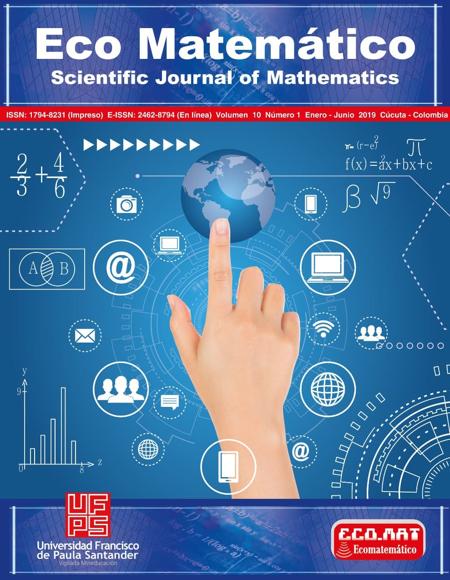Euclid's traveling suitcase, as a didactic strategy to strengthen spatial thinking and geometric systems
La maleta viajera de Euclides, como estrategia didáctica para fortalecer el pensamiento espacial y los sistemas geométricos
Main Article Content
The development of the thought, has a progressive influence on the integral formation of the subjects, in this respect, it became necessary to develop the present investigation, whose general objective was: To strengthen the spatial thinking and the geometric systems in the ninth grade students of the Los Santos Apostles through the didactic strategy, the Euclid Traveling Suitcase, for this, a methodology was framed in the postulates of the action research, where it was considered the implementation of four phases in a systematic way, in this respect, planning was assumed in Firstly, all the elements contained in the Euclid Traveling Suitcase were designed for the development of spatial thinking and geometric systems in ninth grade students, and then the action was presented, where the situations designed were executed, in this case , A set of interventions is evident, which began with f Geometric flat ormas, to later transform them into three-dimensional, for which the students represented a willingness and interest in the development of activities, activities were valued through direct non-participant observation, to give way to reflection, where it was possible to determine that The Euclid Traveling Suitcase has a significant impact on teaching and learning the knowledge inherent in spatial thinking and geometric systems
Downloads
Article Details
Arias, F (2010). El Proyecto De Investigación Introducción A La Metodología Científica. Caracas, Venezuela: Episteme.
Brousseau (2006). Enseñanza de la Matemática. Mac Graw Hill ediciones interamericana. México
Caricote, M. (2008). Métodos de Investigación en Ciencias Sociales. Ediciones Siglo XXI. Argentina.
Cendales, O. (2007). Investigación Acción y Saber Social. Editorial Grao. España.
Díaz, F. (2007). Estrategias de Supe aprendizaje. Editorial Trillas. México.
Fabretti, I. (2009). Estrategias Didácticas. Editorial Gedisa. España.
Fairstein y Gissels (2004). Matemática y su Enseñanza. Editorial Paraninfo. Argentina
Godino, J. y Batanero, F. (2003) Geometría Y Su Didáctica Para Maestros. Departamento de Didáctica de la Matemática. Universidad de Granada. Granada.
González, M. (2005), Estrategias Didácticas. Ediciones El Nacional. Caracas.
Gutiérrez B. L. (1989). Paradigmas cuantitativo y cualitativo en la investigación socio-educativa: Proyección y reflexiones. Revista Paradigma, Vol. XIV al XVII, 1993 – 1996. [Documento en línea] http://www.perio.unlp.edu.ar/Metodologia/texparabajar/locualiylocuantilgutierrez1.doc. [Consulta 2015. Marzo 08].
Hernández, D. (2006). Enseñanza y Aprendizaje. El Reto Social. Ediciones Aljibe. España.
Hurtado, J. (2007). La Investigación Holistica. Sypal. Venezuela.
Klein, M. (2008). Psicoanálisis de Niños. Editorial Paidos. España.
Luengo, M. (2011). Formación didáctica para profesores de matemáticas. Madrid: Editorial CCS
Martínez y Álvarez (2013). Creación de ambientes de aprendizaje en la enseñanza de polígonos; una experiencia de aula desde la educación matemática crítica.
Mena, C. (2008). Estrategias de Enseñanza en la Escuela. Ediciones Oceano. Colombia.
Ministerio de Educación Nacional (2010). Pruebas Saber Pruebas Saber 3º, 5° y 9°. Documento en Línea. Disponible en: http://www.mineducacion.gov.co/1759/w3-article-244735.html Fecha de consulta: 03 de enero de 2017.
Ministerio de Educación Nacional (2015). Documento orientador - Foro Educativo Nacional 2015: ciudadanos matemáticamente competentes
Morgado, M. (2001). Concepciones Pedagógicas de la enseñanza. Editorial Trillas. México
Mûnch y Ángeles (2004). Metodología de la Investigación. Editorial Limusa. México
Núñez, J. (2006). Investigación Acción. FEDUPEL. Venezuela.
Ortiz, P. (2009). El Currículo Oficial. Ediciones Piramidal. Argentina.
Pérez, C. (2009). La Maleta Viajera. Universidad de Malaga.
Ramírez y Chavarría (2009). Análisis de las conceptualizaciones erróneas en conceptos de geometría y sistemas de ecuaciones: un estudio con estudiantes universitarios de primer ingreso.
Rodríguez, Gil y García (1999). Metodología de la Investigación. Mac Graw Hill ediciones Interamericana.
Ruíz, M. (2008). Teorías y Enfoques de Aprendizaje. Ediciones Norma. Colombia.
Vasco, H. (2010). Enseñanza de la Geometría en la Escuela. Editorial Gedisa.
Viera, A. (2008). Matemáticas y medio: Ideas para favorecer el desarrollo cognitivo infantil. Sevilla: DIADA Editora
Zabala, P. (2012). Estrategias para la Enseñanza y el Aprendizaje. Editorial Trillas. México
Zambrano, D (2010). Conocimiento, saber y pensamiento: una aproximación a la didáctica de las matemáticas. EquisAngulo. Colombia







